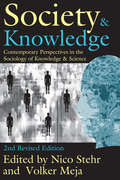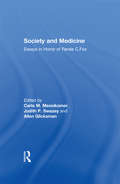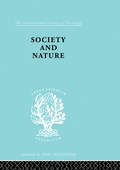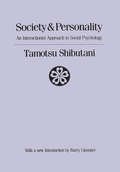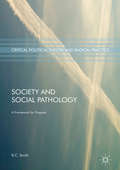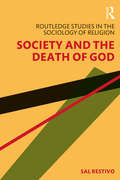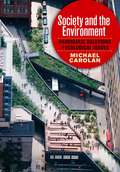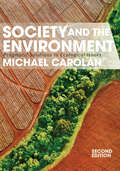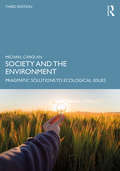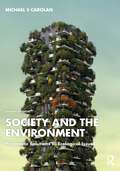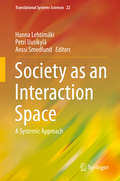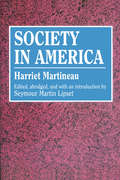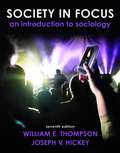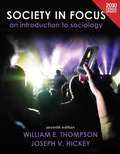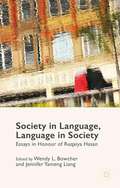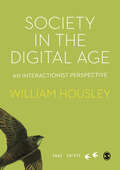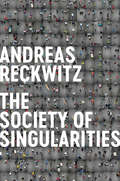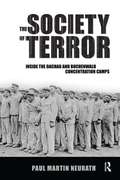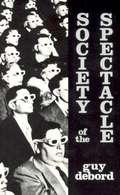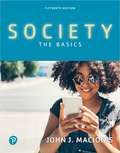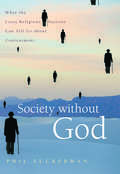- Table View
- List View
Society and Knowledge: Contemporary Perspectives in the Sociology of Knowledge and Science (Sociology Of The Sciences Yearbook Ser. #10)
by Volker MejaThe sociology of knowledge is generally seen as part of the sociology of cultural products. Along with the sociology of science, it explores the social character of science and in particular the social production of scientific knowledge. Knowledge in all its varieties is of crucial importance in social, political, and economic relations in modern society. Yet new realities, the editors argue in their introduction to this second edition, require a new perspective.In the past half century, the social role of knowledge has changed profoundly. The natural attitude toward scientific knowledge in science that assigned a special status to science's knowledge claims has lost its dominance, and the view that all knowledge is socially constructed has gained general acceptance. Science increasingly influences the political agenda in modern societies. Consequently, a new political field has emerged: knowledge politics.These fourteen essays by social scientists, philosophers, and historians cover fundamental issues, theoretical perspectives, knowledge and power, and empirical studies. Eight of the fourteen contributions were part of the first edition of Society and Knowledge, published in 1984, and most of these have been updated and revised for this new edition. Included in this edition are six new contributions by Robert K. Merton, Steve Fuller, Dick Pels, Nico Stehr, Barry Schwartz, and Michael Lynch.This second, revised edition builds on its predecessor in presenting cutting-edge theoretical and empirical efforts to transform the sociology of knowledge. Professionals, policymakers, and graduate students in the fields of sociology, political science, and social science will find this volume of interest and importance.
Society and Medicine: Essays in Honor of Renee C.Fox
by Judith P. Swazey"The essays in this volume pay tribute to the achievements of RenÚe C. Fox in the fields of medicine and sociology. Many of the contributors are Fox's colleagues and former students from medicine, sociology, nursing, and bioethics. The title--Society and Medicine--reflects the leitmotif in Fox's work: her studies of and teaching about the nature of medicine and medical research; the training and work of their practitioners; the interrelationships between medicine and the societies and cultures of which it is a part; and, above all, the moral and spiritual dimensions of the healing arts."
Society and Nature: A Sociological Inquiry (International Library of Sociology)
by Hans KelsenFirst published in 1998. Routledge is an imprint of Taylor & Francis, an informa company.
Society and Personality: Interactionist Approach to Social Psychology
by Tamotsu ShibutaniBeing an "interactionist" approach to social psychology, Society and Personality deals with people, not as isolated individuals, but as participants in groups. The aim of the book is to help the reader develop an orderly perspective—a consistent point of view from which to see his (or her) own conduct and that of his (or her) fellows. Propositions about behavior seen from the viewpoint are presented, and relevant evidence, both descriptive and experimental, is examined and evaluated. The author draws upon the two great intellectual traditions of pragmatism and psychoanalysis, and attempts to integrate them into a single, consistent approach. All concepts are reduced to behavioristic terms—defined always in terms of what people do. In this way, it is possible to draw freely on these two schools, and at the same time, avoid much of the jargon of both. Other approaches to the study of human behavior are frequently mentioned and sometimes discussed, but the objective is to give the reader one perspective rather than confuse him with many. Of course, this standpoint is presented as only one of many possible ways of looking at people. Although the book's basic ideas are drawn from two main schools of psychological thought, relevant material has been gathered from other sources as well—sociology, ethnography, linguistics, experimental psychology, and clinical data from psychiatry. One very important extra feature is the List of Personal Documents, compiled by the author to guide interested readers to first-person accounts—biographies, diaries, clinical records—each of which provides a valuable record of human experience.
Society and Social Pathology: A Framework for Progress (Critical Political Theory and Radical Practice)
by R. C. SmithThis book offers one of the most comprehensive studies of social pathology to date, following a cross-disciplinary and methodologically innovative approach. It is written for anyone concerned with understanding current social conditions, individual health, and how we might begin to collectively conceive of a more reconciled postcapitalist world.Drawing reference from the most up-to-date studies, Smith crosses disciplinary boundaries from cognitive science and anthropology to critical theory, systems theory and psychology. Opening with an empirical account of numerous interlinked carises from mental health to the physiological effects of environmental pollution, Smith argues that mainstream sociological theories of pathology are deeply inadequate. Smith introduces an alternative critical conception of pathology that drills to the core of how and why society is deeply ailing. The book concludes with a detailed account of why a progressive and critical vision of social change requires a “holistic view” of individual and societal transformation. Such a view is grounded in the awareness that a sustainable transition to postcapitalism is ultimately a many-sided (social, individual, and structural) healing process.
Society and the Death of God (Routledge Studies in the Sociology of Religion)
by Sal RestivoThis book advances the "strong" programme that sociology and anthropology provide a scientific foundation for arguing that God and the gods are human creations. Contending that religion is one – but not the only – way to systematize and institutionalize the moral order of a society, the author argues that religion reflects the fundamental human need for belonging and the social function of compassion. As such, our transcendental and supernatural ideas are really concerned with our everyday lives in communities and, faced with the severity and immediacy of the global problems with which the world is confronted – existential threats – it is increasingly important to abandon delusions and correct our mistake in reference, not by eradicating religion, but by grounding it more explicitly in earthly matters of community, social solidarity, belonging, and compassion. A wide-ranging study of the roots, nature, and purpose of religion and theistic belief, Society and the Death of God will appeal to sociologists, social theorists, and philosophers with interests in the scientific study of religion and the role of religion in the life of humankind.
Society and the Environment
by Michael CarolanTalking about global environmental issues need not be an exercise in gloom, doom, and individual sacrifice-as Michael Carolan ably demonstrates in this introduction to environmental sociology.Society and the Environment examines today's environmental controversies within a socio-organizational context. After outlining the contours of "pragmatic environmentalism," Carolan explores the material world: air, water, biodiversity, and trash. He considers the pressures that exist where ecology and society collide, such as population growth and its associated increased demands for food and energy. Finally, he drills into the social/structural dynamics-including political economy and the international legal system-that create ongoing momentum for environmental ills.This interdisciplinary text features a three-part structure in each chapter that covers "fast facts" about the issue at hand, examines its wide-ranging implications, and offers pragmatic consideration of possible real-world solutions. Bolstering the analysis, a variety of boxes highlight relevant case studies as well as the value judgments which lurk everywhere in talk about environmental phenomena. Discussion questions and key terms enhance the text's usefulness, making Society and the Environment the perfect learning tool for courses on environmental sociology.
Society and the Environment: Pragmatic Solutions to Ecological Issues
by Michael CarolanSociety and the Environment examines today's environmental controversies within a socio-organizational context. After outlining the contours of "pragmatic environmentalism,” Carolan explores the material world: air, water, biodiversity, and trash. He considers the pressures that exist where ecology and society collide, such as population growth and its associated increased demands for food and energy. Carolan also investigates how various ecological issues, such as climate change, are affecting our very own personal health. Finally, he drills into the social/structural dynamics-including political economy and the international legal system-that create ongoing momentum for environmental ills.This interdisciplinary text features a three-part structure in each chapter that covers "fast facts” about the issue at hand, examines its wide-ranging implications, and offers balanced consideration of possible real-world solutions. Bolstering that analysis, a variety of boxes highlight relevant case studies as well as the value judgments which lurk everywhere in talk about environmental phenomena. New to this edition are "Movement Matters” boxes, which showcase grassroots movements that have affected legislation. Discussion questions and key terms enhance the text's usefulness, making Society and the Environment the perfect learning tool for courses on environmental sociology.
Society and the Environment: Pragmatic Solutions to Ecological Issues
by Michael S CarolanWithout focusing entirely on what is wrong with the world around us, the third edition of Society and the Environment centers its discussion on realistic solutions to the problems that persist and examines current controversies within a socio-organizational context. After introducing “pragmatic environmentalism,” Carolan discusses the complex pressures and variables that exist where ecology and society collide, such as population growth and the concurrent increase in demands for food and energy, and transportation and its outsized influence on urban and community patterns. With further attention given to the social phenomena and structural dynamics driving today’s environmental problems, the book concludes with an important reflection on truly sustainable solutions and what constitutes meaningful social change. Each chapter in this interdisciplinary text follows a three-part structure beginning with an overview of what is wrong and why. This leads into a discussion on each issue’s wide-ranging implications and, finally, a balanced consideration of realistic solutions. Featuring updated and expanded examples, discussion points, and coverage of recent developments including the US withdrawing from the Paris Agreement, “booming” national economies and wealth distribution, growing global interest in environmental justice—with particular focus on the links between injustice and race and inequality—climate change, and renewable energy, this new edition remains an essential companion for courses on environmental sociology and sustainability.
Society and the Environment: Pragmatic Solutions to Ecological Issues
by Michael S CarolanThe fourth edition of Society and the Environment centers its discussion on realistic solutions to the problems that persist and examines current controversies within a socio‑organizational context, shifting focus away from simply explaining what is wrong with the world around us. Introducing this “pragmatic environmentalism,” Carolan discusses the complex pressures and variables that exist where ecology and society collide, with population growth, the increase in demands for food and energy, and transportation and its outsized influence on urban and community patterns. With further attention given to the social phenomena and structural dynamics driving today’s environmental problems, the book concludes with an important reflection on truly sustainable solutions and what constitutes meaningful social change.Each chapter in this interdisciplinary text follows a three‑part structure beginning with an overview of what is wrong and why. This leads into a discussion on each issue’s wide‑ranging implications and, finally, a balanced consideration of realistic solutions. Featuring updated and expanded examples, discussion points, and coverage of recent developments, including the US withdrawing from the Paris Agreement, “booming” national economies and wealth distribution, growing global interest in environmental justice—with particular focus on the links between injustice and race and inequality—climate change, and renewable energy, this new edition remains an essential companion for courses on environmental sociology and sustainability.
Society and the Policeman's Role (Routledge Revivals)
by Maureen E. CainThe role of the policeman in the community and attitudes towards the police are now matters of active public concern. In this important and enlightening study, first published in 1973, Maureen Cain gives an account of how the police operate in the United Kingdom. Her book will be of great value to sociologists, criminologists and policemen alike.
Society and the Unconscious: Cultural Psychological Insights
by Dieter SandnerThis book will interest anyone seeking a comprehensive understanding of the psychological relationship between individual psychological dynamics, social structure and the unconscious collective paradigms. It focuses on an analysis of patriarchal culture, which is, as it were, the psychological enclosure in which all individual and collective processes take place.Starting from the genesis and current structure of this culture, the strong social changes of the last 50 years are examined:the change in relations between men and womensocial relations in terms of solidarity and desolidarisationthe situation of social security the social and political power relations, andthe economic dynamics.At the same time, collective fantasies are elaborated that emerge from the socio-structural changes. The basis of the study is psychoanalytical cultural theory in the form of a cultural-critical deconstruction of its fundamental assumptions. In 16 interesting chapters, essential questions of psychological cultural theory are answered and practical applications of this theory to current sociostructural processes are shown.
Society as an Interaction Space: A Systemic Approach (Translational Systems Sciences #22)
by Anssi Smedlund Hanna Lehtimäki Petri UusikyläAs digitalization and social media are increasingly blurring the boundaries between traditional societal, political, and economic institutions, this book provides a cross-disciplinary examination of value co-creation. From various standpoints, it examines how institutions contribute to service ecosystems and how digitalization is transforming value co-creation in these ecosystems. Further, the book shares new perspectives on relational dynamics among government, companies, and citizens. These insights fill the gaps between service science and political science by integrating institutional logics into the concept of value co-creation. The book subsequently examines society as an interaction space. Topics discussed include the new logic and transformation mechanisms of economic activities, citizen participation, governance, and policy-making in the face of technological innovations, market-based reforms, and the risk of disconnect between citizens and policy-making. Here the focus is on value co-creation in complex adaptive systems where institutions, individuals, and businesses negotiate value and interests in networked relations. In closing, the book presents a range of empirical case studies on value co-creation, which provide examples of active networked citizenship, innovative governance and policy-making, democratic leadership, and trust-building dialogue among institutions. The studies address the context of Nordic countries, recognized as world-leading democracies. Pursuing a systems approach, the book articulates a social reality composed of interacting and interconnected elements that cannot be captured with only micro or macro levels of analysis. Service ecosystems are considered as configurations of people and technologies embedded in institutionalized rules, cultural meanings, and practices, offering valuable insights into the service-centered view of markets and society. Given the breadth and depth of its coverage, the book offers a valuable resource for all students and scholars interested in understanding and envisioning the future democratic landscape.
Society for New Testament Studies: Innocent Blood and the End of Exile (Society for New Testament Studies Monograph Series #167)
by Hamilton Catherine SiderIn this book, Catherine Sider Hamilton introduces a new lens through which to view the death of Jesus in Matthew. Using the concept of 'innocent blood', she situates the death of Jesus within a paradigm of purity and pollution, one that was central in the Hebrew Scriptures and early Judaism from the Second Temple to the rabbis. Hamilton traces the theme of innocent blood in Matthew's narrative in relation to two Jewish traditions of interpretation, one (in Second Temple literature) reflecting on the story of Cain and Abel; the other (chiefly in rabbinic literature) on the blood of Zechariah. 'Innocent blood' yields a vision that resists the dichotomies (intra muros vs extra muros, rejection vs redemption) that have characterized the debate, a vision in which both judgment and redemption - an end of exile - may be true. 'Innocent blood' offers a new approach not only to the meaning of Jesus' death in Matthew but also to the vexed question of the Gospel's attitude toward contemporary Judaism.
Society in America (Cambridge Library Collection - North American History Ser.)
by Harriet MartineauHarriet Martineau brought to her observations the convictions of a vehement English liberal and an astonishingly modern sociological approach. In 1834 she wrote the first draft of How to Observe Manners and Morals--perhaps the earliest book on the methodology of social research. In abridging the 800-page original for the modern reader, Lipset has concentrated on Martineau's brilliant discussion of religious practices, social status, and childrearing; political apathy and the position of women, blacks, and immigrants; and the American's casual approach to indebtedness and his speculative wealth-or-ruin schemes.
Society in Focus: An Introduction to Sociology (7th Edition)
by William E. Thompson Joseph V. HickeyThis comprehensive introductory text examines and emphasizes the increasing diversity and globalization of societies everywhere and the special role of mass media and information technology in contemporary society.
Society in Focus: An Introduction to Sociology (Census Update, 7th Edition)
by William E. Thompson Joseph V. HickeyExamining the role of mass media and information technology in contemporary society. This specially priced comprehensive introductory text emphasizes the increasing diversity and globalization of societies everywhere, and the special role of mass media and information technology in contemporary society. What is the Pearson Census Update Program? The Census Update edition incorporates 2010 Census data into a course simply and easily. The components of the Census Update Program are as follows: Census Update Edition -Features fully updated data throughout the text, including all charts and graphs, to reflect the results of the 2010 Census. This edition also includes a reproduction of the 2010 Census Questionnaire for your students to explore in detail. 2010 Census Update Primer: A brief seven-chapter overview of the Census, including important information about the Constitutional mandate, research methods, who is affected by the Census, and how data is used. Additionally, the primer explores key contemporary topics such as race and ethnicity, the family, and poverty.
Society in Language, Language in Society: Essays in Honour of Ruqaiya Hasan
by Wendy L. Bowcher Jennifer Yameng LiangThis collection of original articles covers a range of research connecting with the work of the eminent linguist Ruqaiya Hasan. It contains contributions from M.A.K. Halliday, G. Williams, D. Butt, D. Miller and M. Berry among others, an interview with Ruqaiya Hasan, and notes from the contributors about their connection with Ruqaiya Hasan's work.
Society in the Digital Age: An Interactionist Perspective (SAGE Swifts)
by William HousleyIn Digital Society: An Interactionist Perspective, William Housley explores the ways interactionist thinking contributes to our understanding of current trends and topics within digital sociology. Drawing on a range of aligned approaches, concepts and empirical studies, he explores how notions of self and presentation, action and agency, practical reason and interaction are of fundamental importance to our understanding of some of the emerging contours of digital society; inclusive of big data, social media, the social life of methods, algorithmic culture, ‘artificial intelligence’ and the pivot to voice. In doing so, Housley aims to demonstrate the enduring relevance of work associated with Goffman, Garfinkel and Sacks in understanding everyday digital social life. The book provides a range of insights into how sociology and social science continues to draw upon interactionism and aligned traditions such as ethnomethodology in making sense of the Interaction Order 2.0 and beyond.
Society in the Digital Age: An Interactionist Perspective (SAGE Swifts)
by William HousleyIn Digital Society: An Interactionist Perspective, William Housley explores the ways interactionist thinking contributes to our understanding of current trends and topics within digital sociology. Drawing on a range of aligned approaches, concepts and empirical studies, he explores how notions of self and presentation, action and agency, practical reason and interaction are of fundamental importance to our understanding of some of the emerging contours of digital society; inclusive of big data, social media, the social life of methods, algorithmic culture, ‘artificial intelligence’ and the pivot to voice. In doing so, Housley aims to demonstrate the enduring relevance of work associated with Goffman, Garfinkel and Sacks in understanding everyday digital social life. The book provides a range of insights into how sociology and social science continues to draw upon interactionism and aligned traditions such as ethnomethodology in making sense of the Interaction Order 2.0 and beyond.
Society of Singularities
by Andreas ReckwitzOur contemporary societies place more and more emphasis on the singular and the unique. The industrial societies of the early 20th century produced standardized products, cities, subjects and organizations which tended to look the same, but in our late-modern societies, we value the exceptional - unique objects, experiences, places, individuals, events and communities which are beyond the ordinary and which claim a certain authenticity. Industrial society’s logic of the general has been replaced by late modernity’s logic of the particular. In this major new book, Andreas Reckwitz examines the causes, structures and consequences of the society of singularities in which we now live. The transformation from industrial to cultural capitalism, the rise of digital technologies and their ‘culture machine’ and the emergence of an educated, urban new middle class form a powerful engine for the singularization of the social. In late modernity, what is singular is valorized and stirs the emotions, while what is general has to remain in the background, and this has profound social consequences. The society of singularities systematically produces devaluation and inequality: winner-takes-all markets, job polarization, the neglect of rural regions and the alienation of the traditional middle class. The emergence of populism and the rise of aggressive forms of nationalism which emphasize the cultural authenticity of one’s own people thus turn out to be the other side of singularization. This prize-winning book offers a new perspective on how modern societies have changed in recent decades and it will be of great value to anyone interested in the forces that are shaping our world today.
Society of Terror: Inside the Dachau and Buchenwald Concentration Camps
by Nico Stehr Paul Neurath Christian FleckDuring 1938 and 1939, Paul Neurath was a Jewish political prisoner in the concentration camps at Dachau and Buchenwald. He owed his survival to a temporary Nazi policy allowing release of prisoners who were willing to go into exile and the help of friends on the outside who helped him obtain a visa. He fled to Sweden before coming to the United States in 1941. In 1943, he completed The Society of Terror, based on his experiences in Dachau and Buchenwald. He embarked on a long career teaching sociology and statistics at universities in the United States and later in Vienna until his death in September 2001. After liberation, the horrific images of the extermination camps abounded from Dachau, Buchenwald, and other places. Neurath's chillingly factual discussion of his experience as an inmate and his astute observations of the conditions and the social structures in Dachau and Buchenwald captivate the reader, not only because of their authenticity, but also because of the work's proximity to the events and the absence of influence of later interpretations. His account is unique also because of the exceptional links Neurath establishes between personal experience and theoretical reflection, the persistent oscillation between the distanced and sober view of the scientist and that of the prisoner.
Society of the Spectacle
by Guy DebordThis book talks about political and cultural theory and on modernity, capitalism, and everyday life in the late 20th century.
Society the Basics
by John J. MacionisSociety: The Basics, Fifteenth Edition, provides you with comprehensive understanding of how this world works. You will find this title informative, engaging, and even entertaining. Before you have finished the first chapter, you will dis-cover that sociology is both enlightening and useful, and it is also a great deal of fun. Sociology is a field of study that can change the way you see the world and open the door to many new opportunities. What could be more exciting than that?
Society without God
by Phil Zuckerman"Silver" Winner of the 2008 Foreword Magazine Book of the Year Award, Religion CategoryBefore he began his recent travels, it seemed to Phil Zuckerman as if humans all over the globe were "getting religion"--praising deities, performing holy rites, and soberly defending the world from sin. But most residents of Denmark and Sweden, he found, don't worship any god at all, don't pray, and don't give much credence to religious dogma of any kind. Instead of being bastions of sin and corruption, however, as the Christian Right has suggested a godless society would be, these countries are filled with residents who score at the very top of the "happiness index" and enjoy their healthy societies, which boast some of the lowest rates of violent crime in the world (along with some of the lowest levels of corruption), excellent educational systems, strong economies, well-supported arts, free health care, egalitarian social policies, outstanding bike paths, and great beer.Zuckerman formally interviewed nearly 150 Danes and Swedes of all ages and educational backgrounds over the course of fourteen months. He was particularly interested in the worldviews of people who live their lives without religious orientation. How do they think about and cope with death? Are they worried about an afterlife? What he found is that nearly all of his interviewees live their lives without much fear of the Grim Reaper or worries about the hereafter. This led him to wonder how and why it is that certain societies are non-religious in a world that seems to be marked by increasing religiosity. Drawing on prominent sociological theories and his own extensive research, Zuckerman ventures some interesting answers.This fascinating approach directly counters the claims of outspoken, conservative American Christians who argue that a society without God would be hell on earth. It is crucial, Zuckerman believes, for Americans to know that "society without God is not only possible, but it can be quite civil and pleasant."
